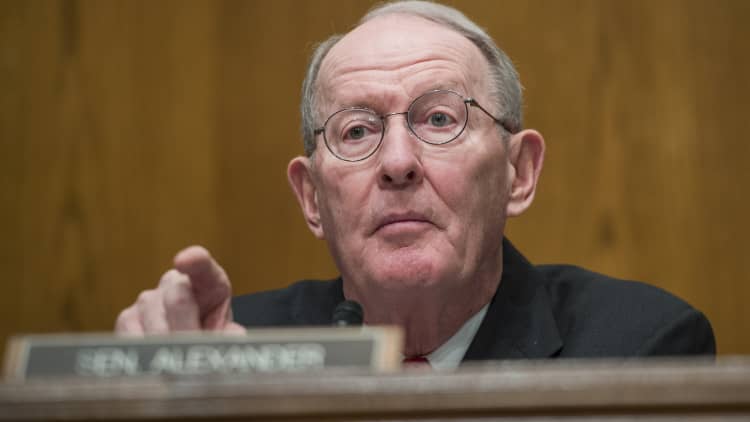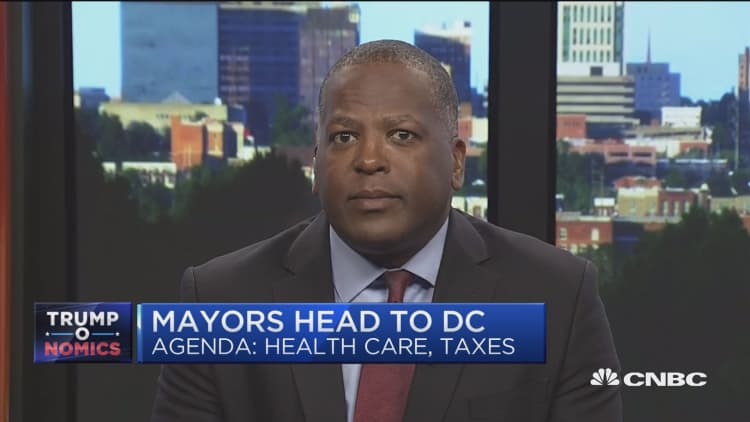
The chairman of the Senate's key health committee urged President Donald Trump to continue making payments on subsidies that reduce out-of-pocket costs for low-income Obamacare plan enrollees, and urged his fellow Republican lawmakers to fund those subsidies through 2018.
"Without payment of these cost-sharing reductions Americans will be hurt," said Senator Lamar Alexander, R-Tenn., in announcing hearings next month to come up with a short-term bipartisan plan to stabilize markets, noting that insurers have said they will have to raise premium rates up to 20 percent if the subsidies are cut.
"If the president over the next two months, and Congress over the next year, take steps to provide certainty that there will be cost-sharing subsidies, that should allow insurance companies to lower the premiums that they have projected," said Alexander.
The Senator is proposing that Congress enact a temporary one-year stabilization funding plan by mid-September, ahead of the Sept. 27 deadline for insurers to commit to sign contracts to provide coverage on health insurance exchanges for 2018.
"It sounds a little late, doesn't it?" said Peggy O'Kane, president of the National Committee for Quality Assurance, a non-profit health firm that works with large employers, doctors and health plans on health quality measures.
"We are at a point of tremendous urgency to get this resolved," O'Kane said, with insurers facing deadlines to file their final rate requests over the next two weeks.
Deadline looms for CSR payment
In the meantime, the Trump administration is facing a deadline when it comes to CSRs the week of Aug. 20. That's when the next payments to insurers are due to be made.
The president has repeatedly threatened to cut off the payments, citing a federal judge's ruling in favor of House Republicans that said CSR funding had not been authorized by Congress. His latest threat came via Twitter in the wake of the Senate's failed Obamacare repeal vote.
That lawsuit, originally brought against the Obama administration, has been on hold while Republicans and the White House worked on repealing Obamacare. The administration and House leaders will need to update the judge on how they want to proceed with the case within the next three weeks.
Additionally, a U.S. appeals court on Tuesday granted a motion filed by 16 attorneys general to defend the subsidy payments, Reuters reported.
Presidential advisor Kellyanne Conway said on CNN last Sunday that the president would make an announcement this week.
"It's unclear to me if decisions have been made at the administration level about this because of hurt feelings" following last week's vote, O'Kane said.
Price impact of CSR uncertainty
The Kaiser Family Foundation has estimated that insurers would need to raise premiums on mid-tier "silver" exchange plans nearly 20 percent for 2018, if CSRs are eliminated.
To account for the risk that the administration could pull the plug on CSRs, many states instructed insurers to submit two sets of rate requests. As a result, some states are now showing just how the Trump administration's decision on the subsidies will directly impact premiums next year.
Covered California, the Golden State's health exchange entity, said that if payments were stopped, exchange plan insurers would be allowed to impose a "CSR surcharge" of 12.5 percent on silver plans next year — which would result in a rate increase of up to 27 percent.
"A decision by the federal government is needed in the next few weeks," said Peter Lee, executive director of Cover California, in a news release. "Without clear confirmation from the administration that these payments are secured, we will be forced to have health insurance companies in California add a CSR surcharge to the Silver-tier rates."
Most exchange plan enrollees who receive tax credits may not feel the full brunt of the increases, because higher premium rates would also result in higher tax credits.
"The federal funds will simply shift to (tax credits) from CSR, and continue to support eligible individuals," said analyst Deep Banerjee, of S&P Global ratings, in a note to research clients,. He added, those who don't receive tax credits "will feel the full brunt of the increase, resulting in a mix of dis-enrollment and buy-downs (to cheaper plans)."
State waiver requests
States are also presenting the Trump administration with a challenge to provide funding to stabilize their markets. Last spring, amid the debate over repealing Obamacare, HHS encouraged states to apply for so-called 1332 waivers.
Minnesota is one of three states that is hoping to get approval for a reinsurance program. The state wants to use the funding to help underwrite insurers' most expensive claims on the exchanges. If the waiver is approved, the state's insurance commissioner says exchange rates in the state could fall as much at 40 percent for 2018.
Oklahoma and Maine have also submitted 1332 waiver requests.
Alexander is hoping that the urgency of the situation will push Congress to act on at least a temporary measure.
"We need to put out the fire in these collapsing markets wherever these markets are," he said.
WATCH: Mayor says US cities want a health-care partner



